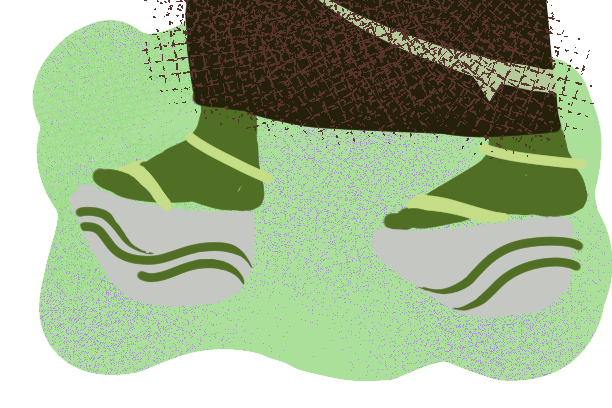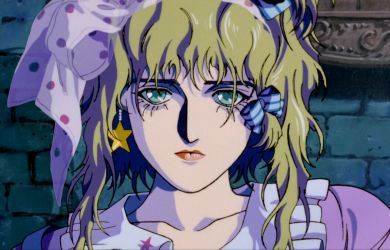
July 26, 2024
Fresh ink: Kitagawa Chiyo Conclusion
Read the moving end of the working-class fable "The Silk Sandals"
In the previous installment of the Fresh Ink series, we presented a translated excerpt of a story by the proletariat girls’ writer Kitagawa Chiyo. “The Silk Sandals” is a working-class moral fable, written by Kitagawa to teach young children harsh lessons about the world. This excerpt introduces the conclusion to the story.
Thus far in the story, five girls have gathered around their favorite teacher Miss Sakaru, who is quitting her job. In lieu of a gift to her beloved students, she offers to tell the girls the story of a pair of adorable, colorful home-made silk sandals that they all long for. The story is about a man running a horse-drawn carriage business, Shosaku Yamaguchi. He and his daughter Ofumi live alone together, forced into poverty by the emerging taxi business. Then, Ofumi falls grievously ill, leading Shosaku into further despair.
One day, Shosaku is transporting an elderly man who asks to stop and go to the bank. Shosaku thinks jealously about how badly he needs money in order to support his daughter. The old man eventually returns and offers Shosaku a generous additional job, but Shosaku can’t shake the feeling of envy. When they finish the trip, the old man is surprised that he doesn’t have his wallet anymore, and wonders if he somehow dropped it or left it in town. Shosaku searches the carriage for the old man and tells him that it isn’t there—even though it actually was.
The next day, Shosaku is racked with guilt but decides to use the money to help his daughter. The doctors and treatments he can now afford improve his daughter’s health. However, the villagers are suspicious of Shosaku’s behavior, and turn him in to the police, where he confesses what happened. Unfortunately, the police believe the old man’s testimony that Shosaku stole the wallet, and sentence him to time in jail. Ofumi visits him in the cold cell only once, and the image of her gaunt features is burnt into Shosaku’s mind.
The story concludes:
The other prisoner in Shosaku’s cell glanced over at him. “Number 1051,” he said. “If you wanna get out of here so bad, make a charm. Use paper and some scrap thread to make sandals. Keep it close and outta sight of the guards. That’ll grant your wish, I’m sure of it.”
Shosaku’s deep frown suddenly rose into a shining smile. Starting from that day, he devoted himself to finding scraps of thread anywhere he could.
One of the worksites in the prison camp was a spinning loom. Shosaku asked one of the prisoners there for help and brought him scraps of thread, a few at a time. Of course, a prison being a prison made it exceptionally hard for Shosaku to find any threads at all. Over three days, he might find one; over a week, maybe two. When the guards weren’t looking, Shosaku fervently scavenged, pouring his heart and soul into the sewing of the sandals.
Oftentimes, he closed his eyes and drew a picture of Ofumi in his mind. To his surprise, the image that appeared wasn’t the gaunt girl who he last saw across the dusty window of the visitation booth, nor the sickly girl who suffered in bed—it was the cute young girl of seven or eight years old from when his wife was still alive. Faced constantly with the picture of bright-eyed, adorable Ofumi with her bobbed hair, he couldn’t help but forget that he was creating the sandals as an amulet. Instead, possessed by fatherly love, he gathered threads of the sorts of bright colors you might find in a museum.
Much later, one day, news arrived. In the dark prison cell, the beautiful, colorful sandals had been created. He hid them in the sleeves of his prison wear, and looked at them whenever he could, thinking in deep silence of the day when he could finally meet his daughter.
Shosaku’s sentence was cut in half thanks to his increasingly good behavior. He would be able to leave jail in just a short while.
Joyous Shosaku started to imagine a new life with his daughter. The charm worked, he thought. Ofumi’s sickness must be completely cured by now, which means she’s probably working some job in town. She’ll be so surprised to see me!
But before Shosaku was able to surprise his daughter, a much greater surprise was waiting for the father. The sunny morning that Shosaku was finally released, he appeared before the prison chief.
“Before you leave, I have something important I need to tell you.”
“Okay.” Shosaku watched the chief’s suddenly hesitant mouth. The chief averted his gaze from Shosaku’s eyes, as if they were shining too brightly.
“I heard that you were talking about going to meet your daughter once you get out of here,” the chief continued. “But I’m sorry to tell you that you won’t be able to. Unfortunately, your daughter has already passed away.”
Shosaku’s breath caught in his throat. He felt on the verge of collapse. His ears barely registered the date that the chief told him—December 20—December 20, wasn’t that the exact same day that the sandals were completed? A day that Shosaku swore he would never forget! A day that Ofumi, wracked by a terrible illness, died in spite of all her father’s prayers. What was the purpose of all those wishes? All of those threads?
A terrible fury flared up inside him, erupting out as a waterfall of tears. Shosaku was at a complete loss for what to do, or how to live. Ofumi, she’s gone. She’s not in this world anymore. Ofumi is dead.
The chief’s heart filled with sympathy for Shosaku. He invited Shosaku to his own house without a word.
For some inexplicable reason, when Shosaku crossed the gates, his blackened, crumpled soul suddenly perked up under a flash of some mysterious light. The young girl greeting them at the gates looked strangely similar to Ofumi.
She was the chief’s niece—an orphaned girl he had taken into his family when she was seven. Not only did she resemble Ofumi, but the two were the same age. It was as if the Ofumi from two years ago had grown just that amount as an ordinary, healthy student. Shosaku’s previously desolate world was penetrated by a thin ray of love.
The soft heart of a father who had lost everything was bound to resonate with that of an orphan. When the two began to speak, it was almost as if they knew each other—indeed, one from afar might mistake them as father and daughter.
Shosaku always kept the silk sandal with him. One day, he decided to pass it on to the girl. She graduated from a girls’ school, and now she was moving to Tokyo to continue her studies. Shosaku had been sick with a cold the day before, but he woke up completely refreshed to carry her luggage and see her off.
“Miss, take care of yourself,” Shosaku said. “Enjoy your life in Tokyo. Ofumi and I will always be rooting for you.”
Perhaps Shosaku already knew that his illness was only going to get worse. That very night, he collapsed with a high fever. Pneumonia—that’s what the doctor pronounced. He passed away just three days later. The silk sandal became the orphaned girl’s only memento of Shosaku.
I think you girls might have already guessed who that orphan was. This is the reason why that sandal is so precious to me. Every time I look at the sandal, I call out to Shosaku’s soul.
I say to him, “Shosaku, I’m enjoying my life. Look, look how happy I am.”
That was the end of Miss Sakaru’s story. Her smooth cheeks were slightly red. We knew why she could say that she was so happy now—because she was quitting her job as our teacher to become a bride…
Read our last piece from Japanese literature: Fresh Ink: Musashi Miyamoto







